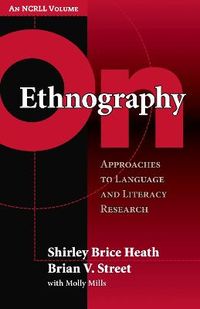
endast ny
On Ethnography
The authors weave together narratives of practice and theory that draw on their own field work and that of a novice ethnographer. Their stories take us outside the usual progression of how-to-do-ethnography, which moves from research question to data collection and analysis to publication. Readers learn of the motivations and mishaps behind the authors' own classic ethnographic studies of language, multimodal literacies, and community practices. The authors use their stories to illustrate the power of curiosity, connection, and continuity in ethnographic pursuits. Keeping language and literacy the central concern, this volume offers practical ways for ethnographers to sustain their attention to a constant comparative perspective and to patterns of co-occurrence in language structures, uses, and values. Appropriate for new and experienced researchers, this readable volume: Illustrates three primary learning environments for the work of ethnographers: self-directed learning, informal communities of learners, and instructional settings within formal education. Stresses that "doing ethnography" involves engagement with public life and cannot be separated out as an academic activity. Includes examples of ethnographic studies in Australia, Iran, South Africa, the United Kingdom, and the United States.
Utgiven: 2008
ISBN: 9780807748664
Förlag: Teachers' College Press
Format: Häftad
Språk: Engelska
Sidor: 168 st
The authors weave together narratives of practice and theory that draw on their own field work and that of a novice ethnographer. Their stories take us outside the usual progression of how-to-do-ethnography, which moves from research question to data collection and analysis to publication. Readers learn of the motivations and mishaps behind the authors' own classic ethnographic studies of language, multimodal literacies, and community practices. The authors use their stories to illustrate the power of curiosity, connection, and continuity in ethnographic pursuits. Keeping language and literacy the central concern, this volume offers practical ways for ethnographers to sustain their attention to a constant comparative perspective and to patterns of co-occurrence in language structures, uses, and values. Appropriate for new and experienced researchers, this readable volume: Illustrates three primary learning environments for the work of ethnographers: self-directed learning, informal communities of learners, and instructional settings within formal education. Stresses that "doing ethnography" involves engagement with public life and cannot be separated out as an academic activity. Includes examples of ethnographic studies in Australia, Iran, South Africa, the United Kingdom, and the United States.
Ny bok
487 kr512 kr
5% studentrabatt med Studentapan
Begagnad bok (0 st)
Varje vecka tillkommer tusentals nya säljare. Bevaka boken så får du meddelande när den finns tillgänglig igen.



